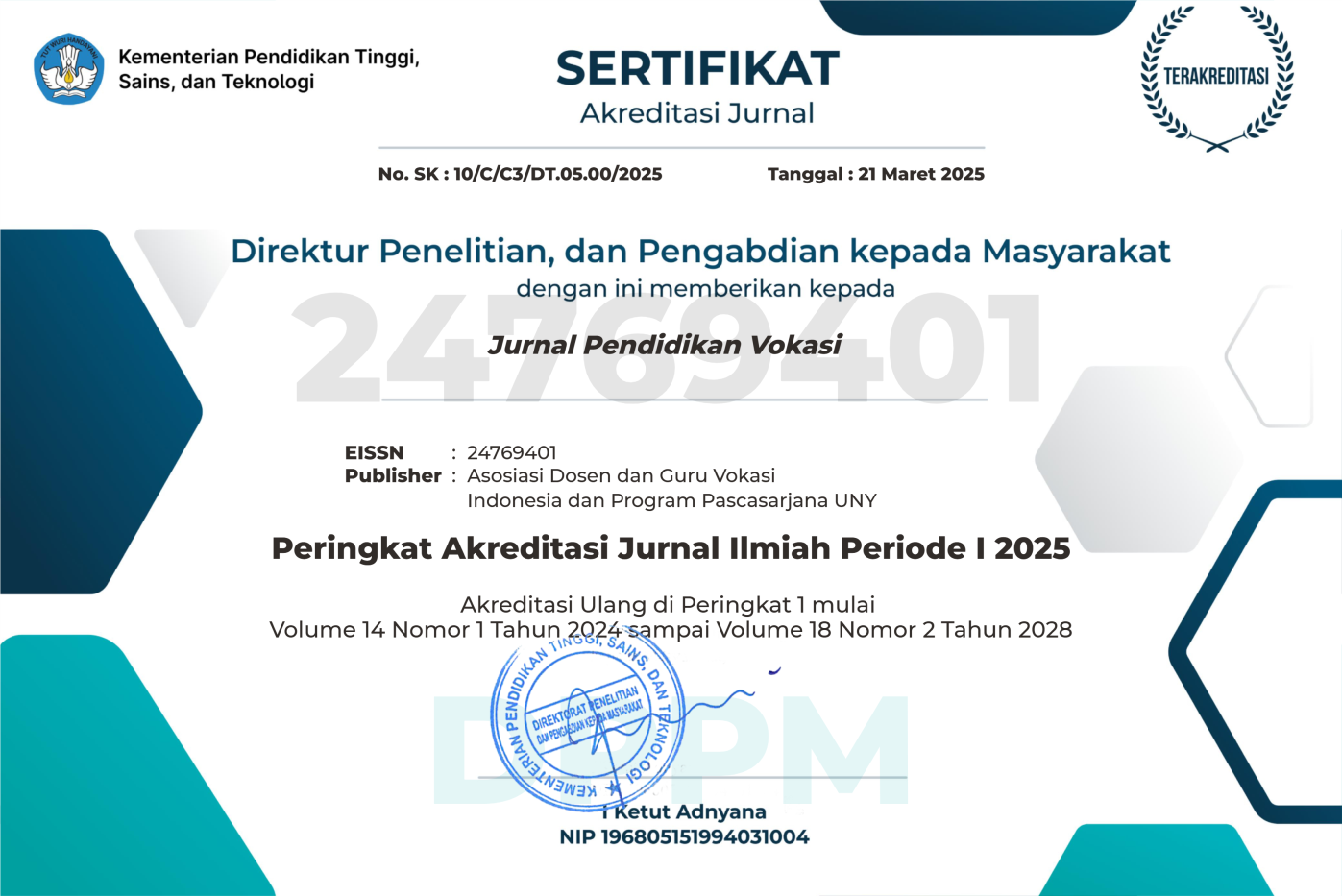Entrepreneurial character education through the school culture in the vocational high schools
DOI:
https://doi.org/10.21831/jpv.v8i2.20354Keywords:
entrepreneurial character education, school culture, VHSAbstract
The study was to describe the implementation of the entrepreneurial character education through the school culture in the vocational high schools (VHSs).The method that the researcher made use in the study was the qualitative one. The study was conducted in the 2 Depok Public Vocational High School and the 2 Pengasih Public Vocational High School. The data source in the study was the school members, the documents, and the school cultures. The data was collected by means of observation, interview, and documentation. For the instruments, the researcher made use of the human instrument and the interview guideline. The data was analyzed by using the open coding, the axial coding and the selective coding. The findings in the research were as folows: the entrepreneurial character education by means of the school culture implementation in the VHSs had been included in the entrepreneurship culture through: (1 ) the five artifacts in the verbal/conceptual dimension that might generate 17 dominant entrepreneurial characters; (2) the five artifacts in the action/behavioral dimension that might generate 8 dominant entrepreneurial characters; and (3) the four artifacts in the physical/material dimension that might generate seven dominant entrepreneurial characters.
References
Akbar, A. I. (2009). Pendidikan berbasis hard skill dan soft skill. Retrieved February 15, 2012, from http://mk-administrasinegara.blogspot.com/2009/0 6/pendidikan-berbasis-hard-skill-dan- soft.html.
Anonim. (2003). Studi efektifitas pemberian beasiswa bakat dan prestasi, pengembangan kultur sekolah dan analisis studi kebijakan. Yogyakarta: Program Pascasarjana UNY.
Berkowitz, M. W., & Bier, M. C. (2005). What works in character education: A research-driven guide for educators. Washington: Marillac Hal. Retrieved from http://www.character.org/uploads/PDFs/White_Papers/White_Paper_What_Works_Practitioner.pdf
Ciputra. (2008). Ciputra quantum leap: Entrepreneurship mengubah masa depan bangsa dan masa depan anda. Jakarta: PT. Elex Media Komputindo.
Depdiknas. (2003). Pedoman pengembangan kultur sekolah. Jakarta: Direktorat Pendidikan Menengah Umum, Dirjen Dikdasmen, Departemen Pendidikan Nasional.
Dharma, S. (2009). Bahan belajar fleksible : kewirausahaan. Jakarta: Direktorat Tenaga Kependidikan Dirjen PMPTK.
Elkind, D. H., & Sweet, F. (2004). How to do character education. Retrieved January 11, 2012, from http://www.goodcharacter.com/ Article_4.html.
Goleman, D. (2006). Kecerdasan emosional: Mengapa EI lebih penting dari IQ. Jakarta: Gramedia Pustaka Utama.
Hatch, M. J. (1993). The Dynamics of organizational culture. The Academy of Management Review, 18(4), 657–693. Retrieved from http://links.jstor.org/sici?sici=0363-7425%28199310%2918%3A4%3C657%3ATDOOC%3E2.0.CO%3B2-E
Kotter, J. P., & Hesket, J. L. (1997). Corporate culture and perfomance. (B. Molan, Trans.). Jakarta: PT. Prehhallindo.
Nuh, M. (2010). Desain induk pendidikan karakter kementerian pendidikan nasional. Jakarta: Kementrian Pendidikan Nasional.
Presiden Republik Indonesia. Instruksi Presiden Republik Indonesia Nomor 4 Tahun 1995 tentang Gerakan Nasional Memasyarakatkan dan Membudayakan Kewirausahaan (1995).
Prosser, C. A., & Quigley, T. H. (1950). Vocational education in a democracy. Chicago: American Technical Society.
Ramly, M., Utomo, E., Sutjipto, Hasan, S. H., Wahab, A. A., Mulyana, Y., ... Ismail, A. B. (2010). Pengembangan pendidikan budaya dan karakter bangsa. Jakarta: Pusat Kurikulum, Balitbang, Kemendiknas.
Samani, M., & Hariyanto. (2011). Konsep dan model pendidikan karakter. Bandung: Rosdakarya.
Sathe, V. (1985). Culture and related corporate reality. Homewood: Ricard D Irwin.
Schein, E. H. (2004). Organizational culture and leadership (4th ed.). San Fransisco: Josey-Bass.
Sobirin, A. (2009). Budaya organisasi. Yogyakarta: UPP STIM YKPN.
Stolp, S. (1994). Leadership for school culture. Retrieved January 8, 2011, from http://eric.uoregon.edu/publications/dige sts/digest091. html
Stolp, S., & Smith, S. C. (1995). Transforming school culture: stories, symbols, values & the leader's role. (U. of Oregon, Ed.). Oregon.
Usman, H. (Ed.). (2010). Pengembangan pendidikan kewirausahaan. Jakarta: Pusat Kurikulum, Badan Penelitian dan Pengembangan, Kementerian Pendidikan Nasional.
Want, J. (2007). Corporate culture. New York: St. Martin's Press.
Downloads
Published
How to Cite
Issue
Section
Citation Check
License
The authors submitting a manuscript to this journal agree that, if accepted for publication, copyright publishing of the submission shall be assigned to Jurnal Pendidikan Vokasi. However, even though the journal asks for a copyright transfer, the authors retain (or are granted back) significant scholarly rights.
The copyright transfer agreement form can be downloaded here: [JPV Copyright Transfer Agreement Form]
The copyright form should be signed originally and sent to the Editorial Office through email to jpvokasi@uny.ac.id
Jurnal Pendidikan Vokasi by http://journal.uny.ac.id/index.php/jpv is licensed under a Creative Commons Attribution-ShareAlike 4.0 International License.












